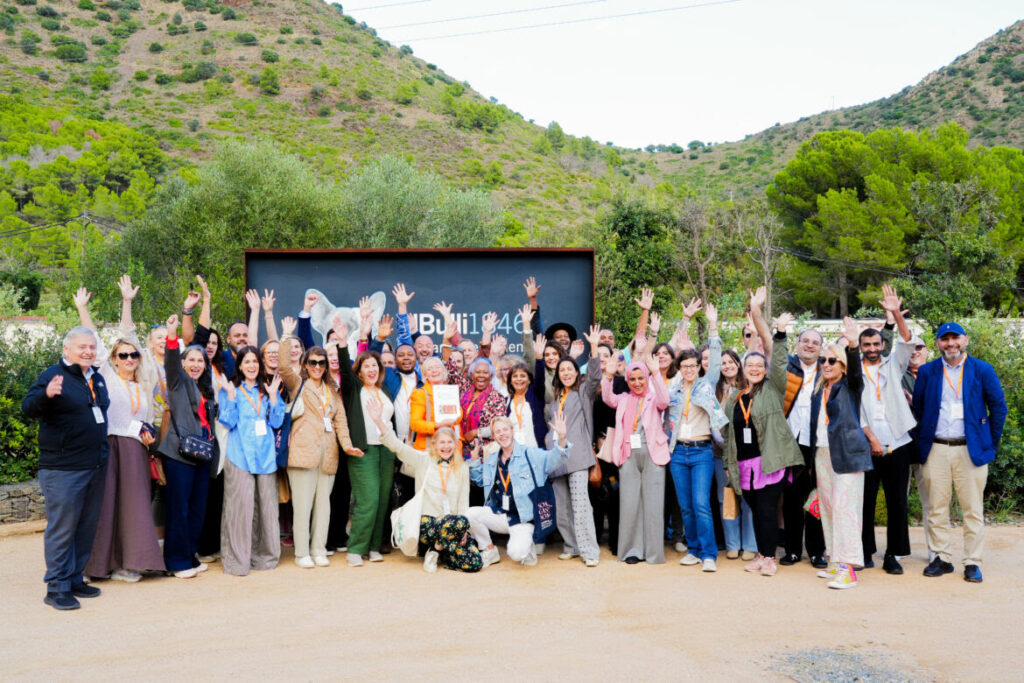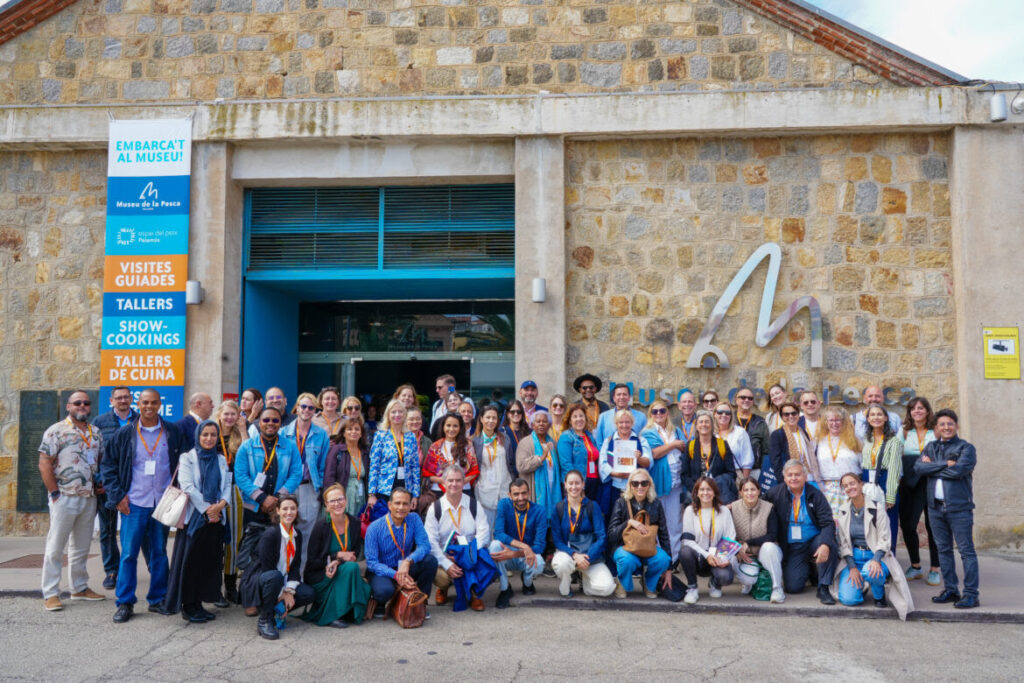| The 30th Platform Meeting of the World Regions of Gastronomy took place in Catalonia, 24–26 September 2025, gathering representatives from more than 30 awarded and candidate gastronomic regions, international experts, and key stakeholders committed to harnessing food as a driver for sustainability, education, and cultural exchange. |

| Hosted by Catalonia, European Region of Gastronomy 2016 and World Region of Gastronomy 2025, the meeting offered an inspiring three-day programme combining field visits, conversations, and cultural encounters. Delegates explored how food and gastronomy can fuel creativity, foster education, regenerate ecosystems, and ensure well-being for all. |
Day 1: Creativity and Innovation
| The meeting began with a visit to elBulli1846, guided by Lluis Garcia, General Director of El Bulli Foundation, where participants discovered the legacy of Ferran Adrià and Juli Soler, and how elBullifoundation continues to nurture creativity and culinary innovation. |
| An official welcome followed at Celler La Vinyeta, where Dr. Diane Dodd, IGCAT President, Laura Ruana, Government of Catalonia, and Bea Nubiola, Catalan Tourism Board, greeted delegates. The evening continued with a dinner and tour of the winery, introduced by Josep Serra i Pla and Marta Pedra, highlighting La Vinyeta’s pioneering model of sustainability and circular farming. |

Day 2: Educating and Imagining Our Food Future
| The second day opened at the Palamós Fishing Museum, with a guided visit by Marta Rodeja, showcasing maritime heritage, sustainable fishing, and the Aula Blava project. |
| The first Conversation on Inspiring Spaces, moderated by Omar Valdez (Andorra), featured contributions from Francisco Guitard (First Coast candidate World Region of Gastronomy 2030, Florida), Patrick Sam (Creative Culture Investments, Namibia), Robert Oliver (Pacific Island Food Revolution, New Zealand), Prof. Vincenzo Russo (Sicily, European Region of Gastronomy 2025), and Ruqaya Al Habsi (Ministry of Heritage and Tourism, Oman). |
| At Celler Abadal, delegates enjoyed lunch and wine heritage guided by Marta Membrives, before engaging in the Conversation on Regenerative Tourism and Food Heritage, moderated by Wendy Barrie (Scottish Food Guide, UK). Speakers included Blanca Cros (Catalonia World Region of Gastronomy 2025), Votausi MacKenzie-Reur (Lapita Café, Regenerative Vanua, Vanuatu), Jaume Gomila (Menorca, European Region of Gastronomy 2022), Patricio Tamariz (Manabí World Region of Gastronomy 2026), and Sandra Bergsnev (Trondheim-Trøndelag, European Region of Gastronomy 2022). |
| The day concluded with a visit to the Monastery of Sant Benet, a Benedictine landmark transformed into a cultural hub that bridges history, gastronomy, and innovation, followed by a four-course dinner at Mas de la Sala Hotel, where guests enjoyed refined yet authentic Catalan flavours. |
Day 3: Good Food for Everyone
| The final day began at the Alícia Foundation, guided by Toni Massanés, where participants learned about advances in food innovation, health, and inclusivity. |
| The Conversation on Good Food for Everyone, moderated by Ivana Vladović (Split Dalmatia Tourist Board, Central Dalmatia European Region of Gastronomy 2026), brought together perspectives from Laura Ruana (Catalonia World Region of Gastronomy 2025), Vasia Papailia (South Aegean European Region of Gastronomy 2019), Chef Randie Anderson (Culinary Concepts and Solutions Ltd., Jamaica), Oscar Ekponimo (Chowberry Foundation, Nigeria), and Per Theodor Tørrissen (Nordland, candidate European Region of Gastronomy 2028). Rapporteur Orazio Bellettini (Fuegos Foundation, Manabí World Region of Gastronomy 2026) shared the key takeaways. |
| Delegates then visited El Soler de n’Hug Farm, where they experienced sustainable livestock practices, before learning about Welcome to the Farm (Benvinguts a Pagès). Presented by Bea Nubiola (Catalonia World Region of Gastronomy 2025 Tourism Coordinator) and Montserrat Costafreda (Prodeca), the initiative connects citizens with local producers, reinforcing the vital link between food, farmers, and communities. |
| The meeting closed with a Lessons Learnt session led by Rapporteurs Mayada Badr (Aseer, World Region of Gastronomy 2024), Orazio Bellettini (Manabí, World Region of Gastronomy 2026), and Jerry Spooner (Vanuatu, candidate World Region of Gastronomy 2027), followed by a final dinner at Can Calopa, an urban winery and social project in Barcelona, where closing remarks were given by Bea Nubiola, Laura Ruana, and Jaume Gomila (IGCAT Vice President). |
| The 30th Platform Meeting reaffirmed the importance of learning exchanges and immersive experiences in shaping a shared vision for sustainable food futures. Catalonia’s thoughtful programme demonstrated how gastronomy can serve as a tool for creativity, education, community regeneration, and inclusivity, inspiring regions worldwide to innovate while honouring their cultural and natural heritage. |
| About the World/ European Region of Gastronomy Award |
| The International Institute of Gastronomy, Culture, Arts and Tourism (IGCAT) is the operative institute that oversees the management and coordination of the World and European Region of Gastronomy Award. IGCAT believes that cross-sectoral collaboration will help regions find solutions to current day challenges and thus, the Award is not only given because a region has great gastronomy but because the whole region is working together to create a more sustainable food future. IGCAT encourages not only hospitality industries to participate but everyone across the whole eco-system including public, private, NGO and academic institutions. |
| The first step in applying for the Award is to bring these different entities together. The next stage is to create a bid book that pulls together as many great initiatives as possible so that people within the region themselves can begin to appreciate how rich their resources are. The third stage is a jury visit that concludes with a recommendation for IGCAT Board and a report to help the region in preparing a successful journey. |
| Candidate and awarded Regions of Gastronomy, guided by IGCAT, are working together to strengthen food security through the celebration of distinctive food cultures; create employment by stimulating creativity and gastronomic innovation; nourish children and adults through culinary and cultural education; drive environmental sustainability in tourism, hospitality and agricultural sectors; support balance and sustainable tourism practices; highlight and support expertise from within rural and urban communities, creating connections and sharing good practises; and ultimately they contribute to community health and well-being. |
